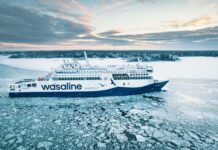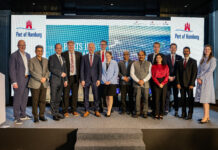Heineken’s announcement:
We are innovating a low carbon transport route with our partners in the Netherlands.
We believe that low carbon transport is essential to securing our sustainable, globally competitive position. As part of our commitment to reduce emissions, we are working to make transportation of goods cleaner and more efficient.
Every year in the Netherlands, some 45,000 containers of beer are transported from our brewery in Zoeterwoude to the port of Rotterdam, where they continue on their journey to the rest of the world. Supplies also make their way back upstream to the brewery. It is an important route involving many stakeholders and, now, some 20 partners have united behind the ambition of making it carbon neutral.
For the first leg of the journey between our brewery and the inland waterway terminal, we are planning for all current trucks to run on renewable fuels while we develop long-term methods of electrical or carbon-neutral transport. The Alpherium, our inland shipping terminal where products are first loaded onto ships, will run on sustainable energy. Here, we will provide the infrastructure to enable ships to run on renewable fuels. We will use existing ships that run partly on renewable fuel sources and we will invest in new ships with fully electrical propulsion systems.
As the ships make their way along the route, we look closely at the surrounding environment at how we can make improvements to the canal route to add to the landscape and biodiversity. We are also looking at carbon-neutral ways to operate bridges and locks along the way.
Finally, when our containers reach the port of Rotterdam, we will provide the infrastructure to supply sustainable energy to equipment and ships. Digital techniques ensure goods flow efficiently, for example ensuring all containers return full so we do not waste empty miles. This requires a new level of cooperation with companies that import goods, supported by a new carbon neutral distribution centre next to the Alpherium.
And so the green corridor is created; a carbon neutral, economically sustainable solution that can be used by many different transporters and shippers and that can be applied to other routes. The project involves a complex programme of research, innovation and possibly new legislation to succeed, supported by cooperation between government, business and research institutes.
Right now we are running a “supplier collaboration programme” with Alpherium. The main goal is to remove non- value-adding costs in our processes. The next step is to define how the cost reductions can be used to fund sustainable alternatives. In the second half of 2018, our new inland barge, the Gouwenaar III, will be ready to operate. The whole project is an exciting prospect. Watch this space!




